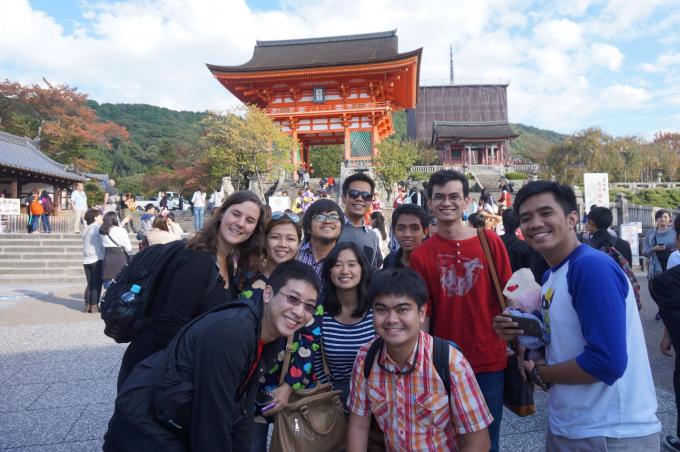AS PART of the Nara Institute of Science and Technology (Naist) Project for Interns (NAPI), eight School of Science and Engineering (SOSE) students worked in different research laboratories at Japan’s Naist from October 19 to November 2.
The Naist, which is composed of graduate schools of information science (IS), biological science (BS) and materials science (MS), is a top-ranked Japanese university for both education and research.
Naist’s internship program, NAPI, aims to use science and technology to promote interdisciplinary and international cooperation.
Master of mathematics student Victor Antonio, computer science senior Camille Ruiz, master of electronics engineering student Benjz Sevilla and computer engineering supersenior Dominic Enriquez worked in the laboratories under the IS graduate school.
Two interns, master of chemistry student Nikita Bacalzo and master of science in biology student Katreena Sarmiento, worked in the BS graduate school laboratories; along with them was recent graduate, Paolo Bareng (MSc in Biology ‘14).
Moreover, master of chemistry student Giancarlo Uygongco and physics and material science engineering supersenior Hani Francisco were accommodated in the laboratories under the MS graduate school.
The interns were assigned to the laboratories that specialize in the same major they are taking up.
In an interview with The GUIDON, Uygongco shared how programs like the NAPI are of great help to aspiring researchers and scientists like him.
He said that the internship inspired and widened his perspective on how to execute his own research in the future.
Similarly, Francisco said the program gives access to aspiring Filipino scientists to work in more advanced laboratories like that of Japan.
Sarmiento, on the other hand, thinks that internship programs such as NAPI could definitely improve Philippine scientific and technological researches.
“The students can actually see and work on world-class facilities and machines that, at first, we could only read in journals,” she said.
The NAPI was spearheaded by NAPI 2014 Coordinator Lorlynn Asuncion Mateo (BC ECE ‘09) and was organized by a group of Ateneo alumni who are currently pursuing graduate studies in Naist.
Learning from experience
The interns devoted their weekdays on working in their respective laboratories where they experienced hands-on activities with most of the experiments.
Uygonco said that his internship at Naist gave him an opportunity to experience world-class scientific research because they were given access to high-technology equipment and resources.
“I’m always reading up on scientific journals and articles, and I was given a chance to actually do that sort of research for a short span of time,” he said.
Francisco, in his working hours at the laboratory, was asked to assist a Naist graduate student from early noon until late afternoon.
“For me, the most memorable part is the work in the laboratory. This is because I genuinely enjoyed doing the experiments that they asked me to do,” said Francisco.
Francisco described his Naist experience as a fruitful one. “I’m confident that the skills I picked up there will prove to be beneficial as they are consistent with what I want to pursue in the near future.”
For her part, Sarmiento was given the opportunity to work on cross-breeding experiments and green fluorescent protein-expression analysis on zebrafish.
Sarmiento was able to work in three different BS laboratories. “I was introduced in each of the laboratories, then the professor and some students introduced their projects and explained to me the focus of their own laboratories.”
Local scientific research
For Francisco, getting the chance to work on facilities in foreign institutes such as Naist can inspire local scientists to improve the state of Philippine scientific pursuit.
“It is undoubtable that experiences [in foreign laboratories] serve as an inspiration to further delve into the field of science and technology, which I believe this country needs,” he said.
According to Uygongco, the scientific research and development sector in the Philippines is facing various problems, such as outdated equipments and obsolete facilities.
However, he said that these problems cannot be attributed to a single root cause alone. “This would be a disservice to the many people working hard to alleviate the problems the sector currently faces.”
Uygongco also identified a lack of communication between the scientists and the laypersons as another problem in the local scientific field.
He shared that, as Philippine Biotech Leader and Entrepreneur Maoi Arroyo puts it, scientists usually “speak nerd” to explain the need of long-term investment on research, which discourages people from being engaged with the topic.
He said that the lack of support for scientists and a lack of people who listen to them result in the trend of brain drain, or the emigration of educated individuals to better working environments.
Sarmiento, however, disagrees that the Filipino scientists and researchers are lagging behind.
She said that they are theoretically equipped and capable of making the best of what is readily available in terms of scientific research.
“When we are exposed to other countries, such as during conventions or this type of internship, and submerged into the different topics relating to our respective expertise, I can say that we could respond and give out our own ideas,” said Sarmiento.







